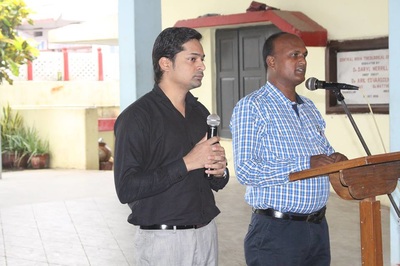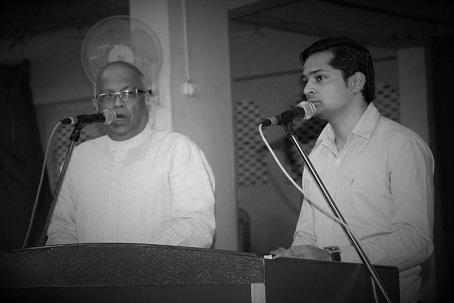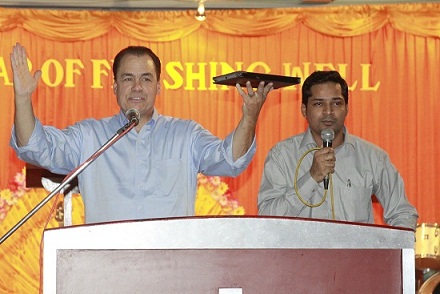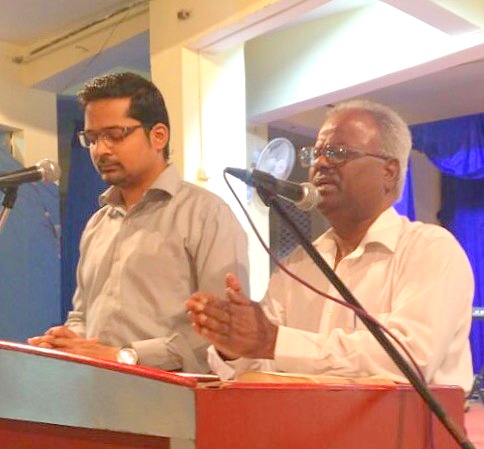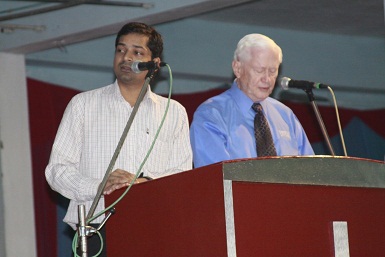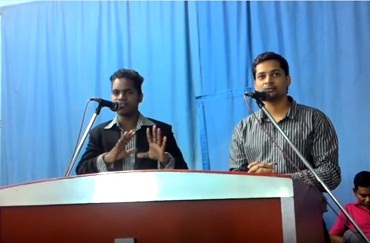The following are the
outline/ draft of the proceedings.
Day
One
Moses P. Manohar presented the session on “Issues of
Ecumenism and Secularism in India” under three primary questions: what is your
produce / product as a theologian (as theological students)? What is theology?
What is secularism? For him, theology is primarily concerned about/ of two
things: sin and salvation. And the task of the theologians or theological
students is to identity issues of sin and salvation. Sins in India are
manifested in the forms of injustice, injustice in the form of corruption,
violence, domestication of women, discrimination, oppression, marginalization,
etc. According to Manohar, salvation is liberation; liberation from all social
evils, oppression, injustice, etc. Then, he attempts to define secularism from the
perspective of the Indian constitution i.e. secularism as separation of caste
and religion. With that note, he suggests that secularism in India as mission;
mission towards equality.
On the topic “Transgender issues/ (homophobia)”Akkai
Padmashali attempts to define transgender or homophobia, gender, and sexuality.
Padmashali defines transgender as reversal of female to male or male to female.
And she sees homophobia as the perception or reaction of as perceived by the
society at large, which may be in the form of prejudice, fear or dislike. She
defines gender not just as a person born with male or female organ but what
society expects of a male or female. For instance, like the social patriarchal
projection of certain feminine or masculine quality on a person. Her definition
of sexuality is seen from four different outlooks – orientation, choice, preference,
and behavior.
The session on “Understanding rights and
responsibilities of a citizen” by Moses P. Manohar can be underlined under
three basic questions: “What is a nation? Who is a citizen? What is a right?”
For him, the very concept of a nation is seen as an idea; an idea that which
continues to grow. Citizen for him is a legal body or political body or unit of
a nation. He then defines right is a legal entitlement which may be inclusive
of the right to politics, right to religion, right to information, right to
education, right to employment, right to food, and right to political economy.
Attempt is also made to define the different types of nation in India: (i)
Ganthian type which is a panchayat form of nation (ii) Nehru type which is a
welfare or industrialized form of nation and (iii) Ambedkar type which is a
right based form of nation. He concludes his session with the suggestion that
politics in India is a saving acts; it has to give right, liberty, and
prosperity.
In the topic “Critiquing Media” Manoj Samuel takes
the task to critique media from a twofold perspective – news media (news paper)
and entertainment media (movie). Samuel begins with the suggestion that media
is the key to our social fabric. In other words, he sees media as possessing
the potential to manipulate the social functioning or practices. On the first
section, he argues that newspapers are written from a subjective journalist perspective
or they flash the news according to target rate pointing (trp). They also have
their subjective interest; it is highly a sociological issue; newspaper tells
honest mistake news. With that concern, he probes on the issue of truth or what
is/ are the news that is to be seen as truth. On the second section, argument
is made that movies or cinemas takes stereotyping approach. It is also to be
noted that public or movie views endorse movies or its ideologies for self
gratification. With these said concerns, he suggests that media ought to report
accurate news, promote understanding (not disharmony), and play proactive role
in promoting communal harmony.
Day Two
The day began with “Devotion” by Chittranjan Polson from Genesis 1. The emphasis of this reflection
is on how the earth itself is able or potentiated to sustain itself or other
life forms. In implication, we are encouraged to take care of the creation.
On the session “Bible Study: Challenges of
Secularism in India” David Joy attempts to read “John 10:1-21” from a
postcolonial perspective with a specific emphasis on others or equality of
humankind as suggested in “John 10:16.” He is of view that the forces of
colonial powers are still strong in our present context (or among the colonized
states). Not only the wealth and natural resources of the colonized states were
plundered but their cultures or practices or beliefs were also imposed upon by
the colonizers. In other words, the colonized sates were seen as the other.
Hence, when we read the text from the postcolonial lens, we see the social
reality at hand clearly. Then, he goes to suggest four aspects of doing
theology in India: people oriented, identity of tolerant, responsible use of
power, and vision for the cosmos.
In the topic “Environment Issues” Allan Palanna
takes an effort to look at the concept of secularism in relation to ecology. He
begins with the suggestion that there is false assumption that we (humans) are
not affected by the environmental change. He is of view that the environmental
crisis is not just about economic and technological concern, but it also deals
with moral and spiritual issues. Concerning the relationship between
Christianity and ecology, he brings out the accusation made by Lynn White that
Christians are responsible for the present ecological crisis because of their
prime concern for humanity alone. However, Palanna is of view that White takes
a reductionist approach by ignoring the Christian history in relation to
history. Now, concerning the issue on ecology and India, he suggests that both
the secular and the nationalist mode of development have environmental
implications. With that note, he suggests that the contemporary ecological
reality is not just about environmental concerns but it is also about justice.
With that view he suggests a few concerns: look at climate change to climate
justice; move from sustainable development to sustainable life; move from
stewardship to kinship (relational); move further from tree planting to
recovering biodiversity; and approach from the subaltern communities and people
at the margins.
The session on “Religious dialogue” was participated
by Sreedhar (Hinduism), Reshma Parvez (Islam), and H.S. Bhatia (Sikhism) respectively.
Sreedhar asserts that the traditional Hindu or
Hinduism has always been secular i.e. they attempt for a heterogeneous empire
or they encouraged a multi cultural society. But in the present contemporary
context, through political influence or through such other different agendas
there is a projection of a disharmonious social or religious outlook. Parvez
suggest that the traditional Islam/ Islamic law (shyria) who rejects the Indian
definition of secularism. However, among the present scholars of Islam, there
are disputes or differing opinions of whether or not Islam needs to be blended
with the secular state and its legislative. That said, she has an affirmative
of the acceptance of other religions.
Bhatia began with the definition of secularism from
the Sikh perspective. He approached the issue of secularism in India with the
notion of respecting other religion, yet, not interfering within the boundary
of their own. In general, they all saw humanity or the welfare of humankind as
the common ground or mutuality for/ of the expression of their faith.
On the session “Migration Issues” Reji Samuel begins
with an attempt to define migration. In a general sense, it is to be seen as
crossing of a boundary or political unit for a certain period of time.
Migration can be of four kinds: internal and external migration within the
country or nation, emigration (migration from native country
in order to settle in another), and immigration (migration to a
country of which one is not a native in order to settle there).
Migration is further categorized into three categories: migrants, settlers, and
refugees. As part of the paper discussion, reasons are explored as to why one
migrate from one place to another; they are – job opportunities, education,
natural disaster, security, forced migration (social or religious disharmony,
etc. Discussion is also done on the problems faced by the migrants, settlers,
and refugees. The findings are – identity crisis, violence, security, conflict,
education, justice issues, adjustment issues, emotional problems, marriage
issues, citizen rights, landless (property righty), religious issues,
unemployment, climate issues, language problem, human trafficking; gender
violence, exploitation, health issues, racial issues, public toilet,
exploitation, legal problems, class ceiling, etc. Exploration is also made on
the theological paradigm of incarnation and the image of God to respond to the
current issues of migration in India. That said, migration to be seen as an
opportunity for the church, for ministry; meet the emotional need, holistic
ministry, counseling, paternal support, and multi ethnic or multi
denominational approach.
Day Three
The day began with devotion on/ of “Eco friendly
worship” led by Sudhakar Joshua. The devotion was conducted in a liturgical
format in an eco friendly setting. The emphasis of this reflection is to
acknowledge the harm we (humans) has caused or tempered the harmonious
functioning and productivity of the nature. And it concluded with the
suggestion to better our dealings or behavior towards better harmonious existence
of the created order.
Kiran Jeevan addresses the issues of “Understanding
religious pluralism in India” under the category of personal experience, writings
from others, caste, and religion, from the social worker perspective.
Challenges for doing
theology in India today
Group One: Understand the context; relate scripture
to the context; reflection of context towards oriented theology
Group Two: Holistic mission; understanding Indian
politics; practical implementation; leading a pro-environment lifestyle; acceptance of diversity; right
attitude towards ourselves and others
Group Three: inter religious-social-political
dialogue; inclusiveness; relative distinctiveness of Christ; apotheosis (being
divine); growing in the likeness of Christ; wider humanism; anthropocentric to
cosmoscetric; pneumatic democracy;
Group Four: understand/ participate in the
situation; examine the reason or cause; use of media; concern and care
(counseling) for the affected; find the solution; consider the implications; understand
the weakness of others;
Group Five: eco living; eco justice; return to
ethnic mode of life; revision of God’s design; developing world and church
responsibilities;
Group Six: rediscovering the doctrine of
eschatology; reading the scripture from the context; redefine the meaning of
pluralism; discerning the signs of the time
Statement
Towards the other: rethinking how we practice
theology


